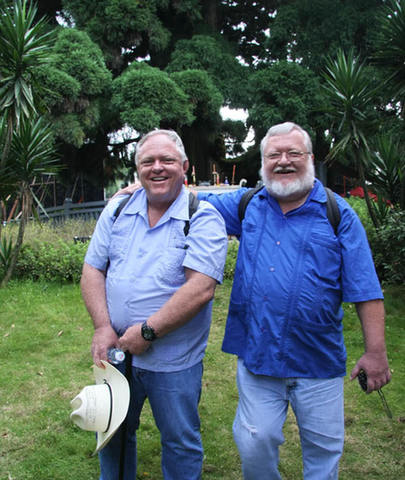Unforgettable Guling
 |
|
On September 26, 2012, Gary and Lee Gardner arrived in Guling. Zhou Xinjian |
Rebuilding Bridges
As part of the homage to her husband, Elizabeth wanted to reconnect with Gardner’s Chinese childhood friends and asked local officials to help her find them.
When nine 90-year-old friends of Gardner were introduced to her, Elizabeth hugged them. She was absorbed in the memories of Gardner recalled by the elders.
According to historical archives, after 1840, Fuzhou opened up to foreign merchants as a trading port. Many missionaries, diplomatic officers and tradesmen from the West came there.
In the summer of 1886, a preacher and doctor named S.F. Woodin stumbled upon the resort village of Guling on his way to visit a patient. Word soon spread. In the following decades, embassy personnel from Britain, France, the U.S., Japan, and Russia established more than 350 resort villas in Guling. They also established a series of public services including sports facilities, a church, a post office, a public well, an international charity agency and swimming pools. They would spend the whole summer with their family members in Guling.
Betty is the daughter of Harold N. Brewster, who, in the 1940s, was the last foreign director of Foochow Christian Union Hospital (now Fujian Medical University Union Hospital). She recalls one summer she and her friends spent a whole day cleaning out the swimming pool so they could spend the next day there. But when they went back the next morning, they found a buffalo wallowing in their sparkling clean pool. They were so angry that they burst into tears.
Gardner’s father Anderson Gardner was a senior clergyman. He lived in Fuzhou City for 14 years and raised a large family there. When the family returned to America in 1910, Gardner was 10 years old.
Gardner went on to become a professor of physics at the University of California. Since retiring in 1978 he had longed to one day visit China again. However, at that time formal diplomatic relations had not been established between China and U.S., so he could not realize his dream. In a sad twist of fate, when China-U.S. relations eventually improved, Gardner was suffering from paralysis.
Evoking the memory of her husband, Elizabeth recalled the finer details of Gardner’s daily routine: He would eat a bowl of porridge every day, a Chinese habit maintained since childhood. As he got older, he would sit outside, remembering his home in Guling and the wild strawberries growing in his garden.
